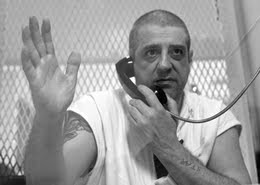One day before the Texas Forensic Science Commission is scheduled to meet for the first time since Governor Rick Perry replaced the chair and all of his other appointees on the commission in order to impede the investigation into the possibility that Texas used faulty arson evidence to convict and execute Todd Willingham, the Texas Tribune has published a long article entitled “Case Open” about another Texas death row inmate claiming innocence. The article ends with the teaser “Tomorrow: Journalism students to the rescue?”, so apparently the Texas Tribune is planning to publish more information on the case tomorrow.
Hank Skinner is set for execution in Huntsville on February 24, 2010.
Hank Skinner is set to be executed for a 1993 murder he’s always maintained he didn’t commit. He wants the state to test whether his DNA matches evidence found at the scene, but prosecutors say the time to contest his conviction has come and gone. He has less than a month to change their minds.
and
Skinner’s execution date approaches as Texas faces renewed scrutiny of its famously busy death row and the science used to convict the accused. Since 1973, just 11 death row inmates have been exonerated, according to the Death Penalty Information Center, while more than 440 have been put to death. The New Yorker last year touched off a national debate about how many of those killed might have been innocent by posthumously profiling Cameron Todd Willingham, who was executed in 2004 after a jury convicted him of killing his three young children by arson in 1991. Before Willingham was executed, according to the story, the state ignored expert reports contending that the fire may have been accidental and calling the method used to prove that it was arson “junk science.” A Texas Observer story earlier this month revealed that a psychologist the state has relied on to test the mental capacity of more than a dozen death row inmates used faulty methods to boost IQ scores so the men could meet the legal standard for the death penalty. And in Dallas County, maverick District Attorney Craig Watkins has launched aConviction Integrity Unit that has reviewed more than 400 cases in which DNA from the crime scene was still available to be tested and has discovered at least 15 wrongful convictions.
In Skinner’s case, attorneys argue that prosecutors selectively used DNA testing to put a potentially innocent man on death row, and that the state is manipulating a 2001 law that allows post-conviction DNA testing to keep him on the path to the death chamber. “The case against him is not open and shut, it’s not ironclad,” says attorney Rob Owen, co-director of the University of Texas at Austin’s Capital Punishment Clinic. “And in a reasonable system, we ought to go the extra mile to rule out the possibility that he is an innocent man before going forward with the execution.”
Read the entire article on the website of the Texas Tribune.
A website with more information on Hank Skinner’s case: http://www.hankskinner.org









For a colorful, full page, compelling summary of all DNA untested, please visit http://www.skepticaljuror.com